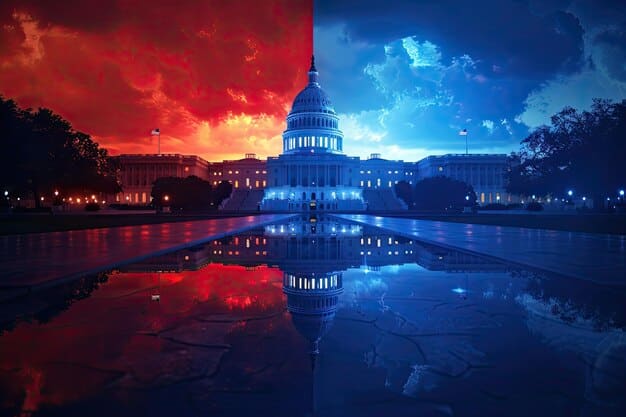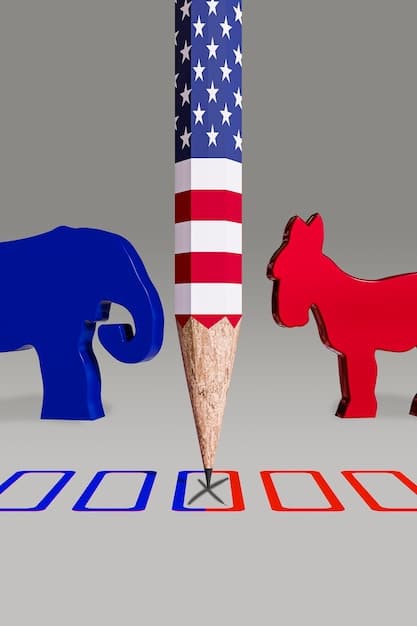Democrats vs Republicans: Key Policy Differences Explained

Understanding the key differences between the Democratic and Republican parties on major policy issues involves examining their distinct approaches to healthcare, the economy, social issues, and foreign policy, revealing fundamental ideological divides that shape their political platforms and legislative priorities.
Navigating the American political landscape requires understanding the core differences between its two major parties. This article breaks down the key differences between the Democratic and Republican parties on major policy issues, offering a clear view of their distinct approaches.
Understanding the Core Ideologies
The Democratic and Republican parties represent distinct ideological viewpoints that shape their policy stances. Understanding these core ideologies is crucial for grasping the key differences between the Democratic and Republican parties on major policy issues.
Democrats generally advocate for a larger role of government in addressing social and economic inequalities, while Republicans typically favor limited government intervention and emphasize individual responsibility.
Democratic Ideology
Democrats tend to support policies that promote social justice, equality, and environmental protection. They often call for government programs to assist those in need and to regulate industries for the public good.
Republican Ideology
Republicans generally advocate for lower taxes, free-market capitalism, and a strong national defense. They often emphasize individual liberty and personal responsibility, with a focus on reducing the size and scope of government.

Healthcare: Approaches to Coverage and Affordability
Healthcare is a deeply divisive issue, largely due to the contrasting views. The key differences between the Democratic and Republican parties on major policy issues are particularly marked in their approaches to healthcare coverage and affordability.
Democrats generally support universal healthcare coverage through government-funded or government-regulated programs, while Republicans tend to favor market-based solutions.
- Democrats: Advocate for the Affordable Care Act (ACA) and believe in expanding access to healthcare through subsidies, Medicaid expansion, and a public option.
- Republicans: Seek to repeal and replace the ACA with market-driven reforms, such as tax credits, health savings accounts (HSAs), and allowing insurance companies to sell policies across state lines.
- Coverage Goals: Democrats prioritize ensuring everyone has access to affordable healthcare, while Republicans focus on reducing costs and increasing individual choice.
Both parties acknowledge the need to address rising healthcare costs, but they diverge sharply on the methods to achieve this goal.
Economic Policy: Taxes, Regulation, and Jobs
Economic policy is another area where the ideological divide between the two parties is pronounced. The key differences between the Democratic and Republican parties on major policy issues are reflected in their approaches to taxes, regulation, and job creation.
Democrats generally favor progressive taxation, government regulation, and investments in infrastructure and education, while Republicans typically advocate for lower taxes, deregulation, and free-market capitalism.

- Taxes: Democrats support higher taxes on corporations and high-income earners to fund government programs and reduce income inequality. Republicans advocate for lower taxes to stimulate economic growth and encourage investment.
- Regulation: Democrats favor government regulation to protect consumers, workers, and the environment. Republicans believe that excessive regulation stifles economic growth and innovation.
- Job Creation: Democrats support government investments in infrastructure, clean energy, and education to create jobs. Republicans advocate for tax cuts and deregulation to encourage businesses to hire and invest.
The parties’ differing economic philosophies shape their approaches to addressing unemployment, inflation, and economic inequality.
Social Issues: Abortion, LGBTQ+ Rights, and Gun Control
Social issues highlight the fundamental value differences. The key differences between the Democratic and Republican parties on major policy issues are often most visible in their stances on abortion, LGBTQ+ rights, and gun control.
Democrats generally support abortion rights, LGBTQ+ equality, and stricter gun control measures, while Republicans tend to oppose abortion, support traditional family values, and advocate for Second Amendment rights.
Abortion
Democrats believe in a woman’s right to choose and oppose restrictions on abortion access. Republicans generally advocate for the protection of unborn life and support measures to restrict or ban abortion.
LGBTQ+ Rights
Democrats support LGBTQ+ equality, including marriage equality, non-discrimination protections, and transgender rights. Republicans often support traditional marriage definitions and religious freedom protections, which may conflict with LGBTQ+ rights.
Gun Control
Democrats advocate for stricter gun control measures, such as universal background checks, bans on assault weapons, and red flag laws. Republicans emphasize Second Amendment rights and oppose restrictions on gun ownership.
These social issues reflect deeply held moral and ethical beliefs that drive the parties’ political agendas.
Environmental Policy: Climate Change and Conservation
Environmental policy is an increasingly important area of disagreement. The key differences between the Democratic and Republican parties on major policy issues are evident in their approaches to climate change and conservation.
Democrats generally support government action to address climate change, promote renewable energy, and protect natural resources, while Republicans tend to prioritize economic growth and energy independence, often questioning the severity of climate change.
Climate Change
Democrats advocate for policies to reduce greenhouse gas emissions, such as the Paris Agreement, carbon taxes, and investments in renewable energy. Republicans often express skepticism about the scientific consensus on climate change and oppose regulations that they believe will harm the economy.
Conservation
Democrats support government funding for environmental protection, conservation of natural resources, and preservation of endangered species. Republicans tend to favor market-based solutions to environmental problems and emphasize private property rights.
The parties’ differing approaches to environmental policy reflect their broader views on the role of government in regulating economic activity and protecting the environment.
Foreign Policy: International Relations and Defense Spending
Foreign policy reveals different global perspectives. The key differences between the Democratic and Republican parties on major policy issues extend to their approaches to international relations and defense spending.
Democrats generally favor diplomacy, international cooperation, and multilateralism, while Republicans tend to prioritize military strength, national sovereignty, and unilateral action.
International Relations
Democrats support international agreements, alliances, and organizations, such as the United Nations and NATO. Republicans often express skepticism about international institutions and emphasize the importance of American leadership.
Defense Spending
Democrats advocate for a balanced approach to defense spending, focusing on diplomacy, foreign aid, and targeted military interventions. Republicans tend to support a strong military and increased defense spending to maintain American supremacy.
The parties’ contrasting views on foreign policy reflect their broader philosophies on America’s role in the world and the best way to promote national security.
Education: Funding, Standards, and School Choice
Education policy showcases differing priorities for the future. The key differences between the Democratic and Republican parties on major policy issues are also present in their approaches to education funding, standards, and school choice.
Democrats generally support increased funding for public schools, national education standards, and teacher training, while Republicans tend to favor local control, school choice programs, and accountability measures.
- Funding: Democrats advocate for increased federal funding for public schools, particularly in low-income communities. Republicans emphasize state and local control over education funding.
- Standards: Democrats support national education standards, such as the Common Core, to ensure that all students are prepared for college and careers. Republicans believe that education standards should be determined at the state and local levels.
- School Choice: Democrats generally support public schools and oppose voucher programs that divert funding to private schools. Republicans advocate for school choice programs, such as vouchers and charter schools, to give parents more options.
The parties’ differing approaches to education policy reflect their broader views on the role of government in promoting equal opportunity and improving educational outcomes.
| Key Point | Brief Description |
|---|---|
| 🏥 Healthcare | Democrats support universal coverage; Republicans prefer market-based solutions. |
| 💰 Economic Policy | Democrats favor progressive taxes; Republicans advocate for lower taxes and deregulation. |
| 🌈 Social Issues | Democrats support abortion rights and LGBTQ+ equality; Republicans often hold conservative views. |
| 🌍 Foreign Policy | Democrats favor diplomacy; Republicans prioritize military strength and sovereignty. |
Frequently Asked Questions
▼
The core ideology of the Democratic Party revolves around social justice, equality, and a larger role for government in addressing societal needs. They advocate for policies that protect the environment and support marginalized communities.
▼
The Republican Party’s core ideology emphasizes limited government intervention, individual liberty, and free-market capitalism. They typically advocate for lower taxes, deregulation, and a strong national defense.
▼
Democrats generally support stricter gun control measures, such as universal background checks and bans on assault weapons. Republicans tend to emphasize Second Amendment rights and oppose restrictions on gun ownership.
▼
Democrats typically favor progressive taxation and government regulation. Republicans often advocate for lower taxes, deregulation, and policies that stimulate economic growth through free-market principles.
▼
Democrats generally support government action to combat climate change and promote renewable energy. Republicans are often skeptical of climate change regulations, emphasizing economic growth and energy independence.
Conclusion
In conclusion, the Democratic and Republican parties have vastly different approaches to major policy issues. These differences stem from fundamental ideological divides regarding the role of government, individual liberty, and societal priorities, shaping the ongoing political discourse in the United States.





